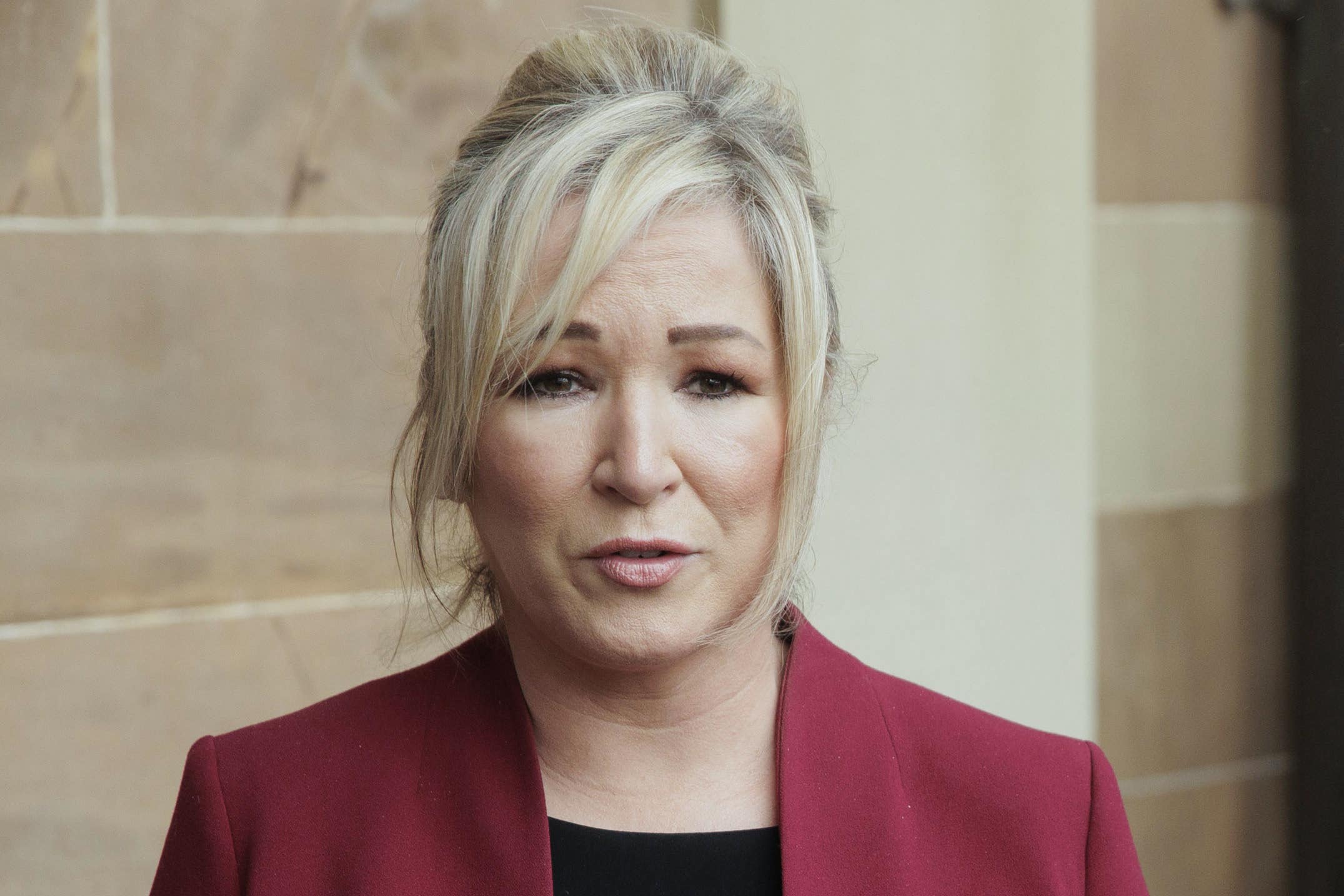Power sharing in Northern Ireland is not under threat, Michelle O’Neill says
The first minister said all parties agreed to focus on cohesion after Sir Jeffrey Donaldson’s shock resignation

Power sharing in Northern Ireland is not at risk despite the turmoil in the DUP following the shock resignation of party leader Sir Jeffrey Donaldson over sex offence charges, Stormont’s first minister has said.
Sinn Fein vice-president Michelle O’Neill said she had approached the leaders of the three other parties in the ministerial executive in Belfast – the DUP, Alliance, and Ulster Unionists – to ensure “cohesion” amid the political fallout.
Sir Jeffrey, 61, quit as DUP leader on Friday after being charged by police; he and a 57-year-old woman were both charged and are due to appear in court later this month. Gavin Robinson, 39, was swiftly appointed interim DUP leader.
The deal that restored power sharing earlier this year hinged on the backing of Sir Jeffrey, and his sudden exit from the political front line has prompted renewed speculation around the stability of the devolved institutions.
Mr Robinson’s views are closely aligned with Sir Jeffrey’s political strategy, but his election as permanent leader is not a foregone conclusion and it remains to be seen whether other candidates, potentially more sceptical of the return of devolution, will emerge.
Ms O’Neill held talks with Mr Robinson and the other party leaders on Friday. “I think everybody was shocked,” she said. “[It’s] a very challenging time, not least for those people that have come forward to the police.
“My priority in this period is to provide that leadership that the public rightly deserve and expect from their political leaders. I’ve spoken to the new interim leader of the DUP, Gavin Robinson. I’ve also spoken to my [Northern Ireland Executive] colleagues, the political leaders around the executive table, just in terms of the work that we have to do, [to make clear] that we need to prioritise cohesion and leadership through these times.”
Ms O’Neill said that all the party leaders share the view that there is no threat to the power-sharing institutions. “The public here rightly deserve our newly formed executive to continue to deliver for them, for now and into the future,” she said. “My priority is to make that power-sharing work.”
Veteran DUP MP Sammy Wilson admitted that his party had been plunged into “turmoil” by the news of the charges against Sir Jeffrey.
He gave his full backing to Mr Robinson, insisting that the DUP should not be distracted by a leadership contest this side of the general election.
“We were all shocked, this just came totally out of the blue,” he said. “Any party which is hit with this kind of shock is bound to be in turmoil. On Thursday, we thought we were getting prepared for a general election. We were going to talk about the kind of themes for the general election, that was really what the focus was, and then suddenly you’re thrown totally off course.”
He added: “I’ve no doubt that the events of this week will galvanise those anti-unionist parties – the SDLP, Sinn Fein, the Alliance [party] will see that we’ve been weakened by this. They’ll make a big push. So we know how crucial this election is, and therefore we’re going to focus now on Gavin getting our message across that, look, there’s a grave threat to the union in this election, and we’ve got to get unionists settled and galvanised and around the party, the only unionist party that can really successfully steer a way through this election.”
Sir Jeffrey, whose career in politics began almost 40 years ago, became DUP leader in July 2021.
He started out as a constituency agent for the Ulster Unionist MP Enoch Powell, and in 1985, aged 22, he was the youngest person to be elected to the Northern Ireland Assembly.
His relationship with former Ulster Unionist Party leader David Trimble deteriorated when he led a walkout during the 1998 peace talks after opposing the early release of republican and loyalist prisoners.
He was recognised by the late Queen in her 2016 birthday honours and was given a knighthood.
Subscribe to Independent Premium to bookmark this article
Want to bookmark your favourite articles and stories to read or reference later? Start your Independent Premium subscription today.
